
AI is transforming business operations, cutting costs, and boosting productivity. This article highlights five top tools - Prompts.ai, Lindy, Domo, Gumloop, and VectorShift - that simplify workflows, reduce errors, and help businesses stay competitive. Each tool offers unique features, from AI orchestration to automated data analysis, making them suitable for diverse industries, including regulated sectors like healthcare and finance.
Key Takeaways:
These tools help businesses manage tasks efficiently, integrate with existing systems, and maintain security compliance. Whether you're looking to reduce manual effort or scale operations, these platforms can deliver measurable results.
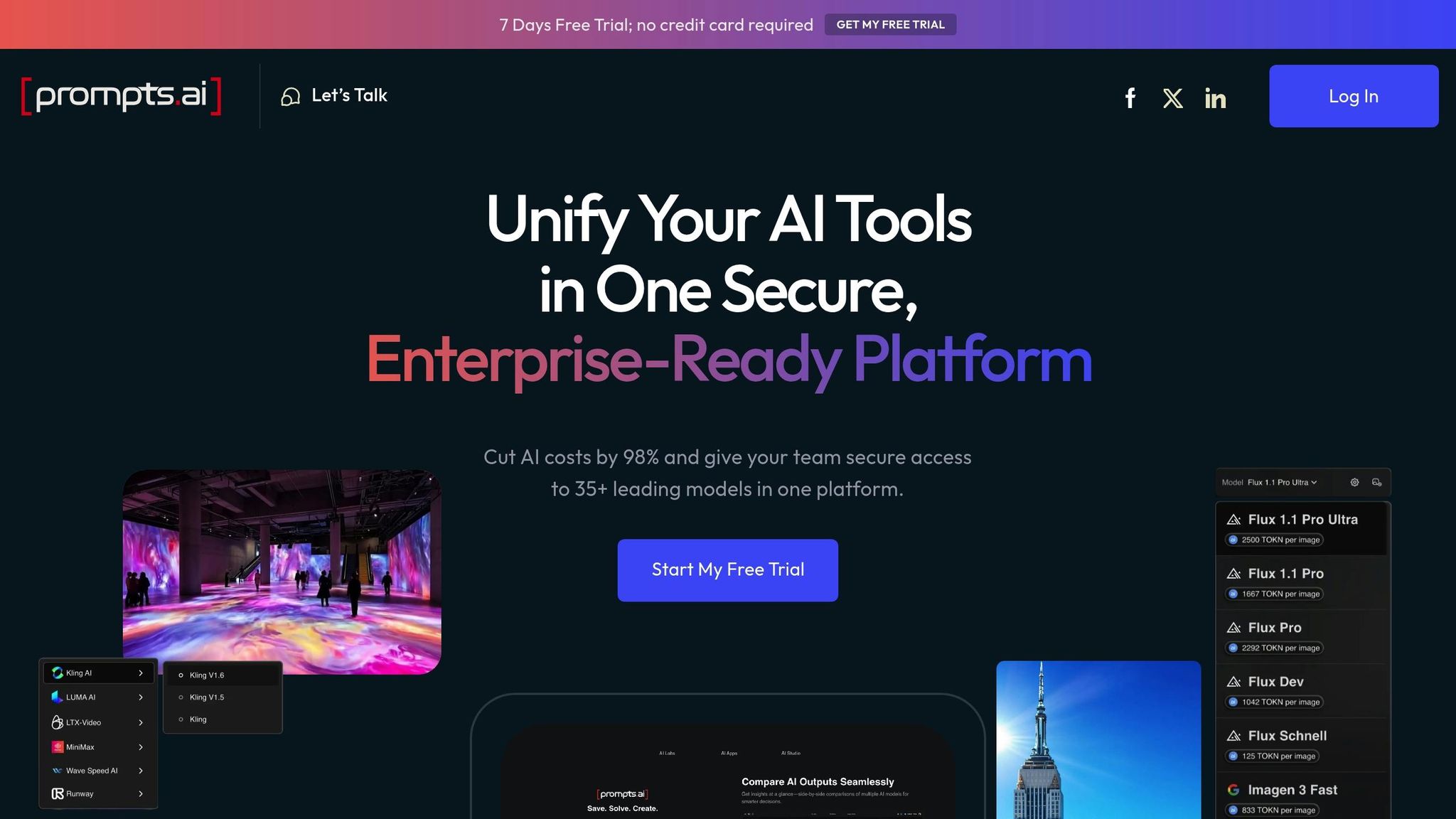
Prompts.ai is an enterprise-grade AI orchestration platform that unifies over 35 top language models into a single, secure interface. Instead of juggling multiple AI tools, businesses can access models like GPT-4, Claude, LLaMA, and Gemini through one centralized dashboard. This streamlined approach eliminates the confusion and inefficiency of managing scattered AI tools, a common challenge for many U.S. companies adopting AI.
The platform introduces a pay-as-you-go TOKN credit system, allowing businesses to pay based on actual usage rather than committing to costly subscriptions. This flexible pricing structure helps organizations manage their AI budgets effectively while integrating seamlessly into robust workflows.
Prompts.ai turns experimental AI use into standardized, compliant workflows with its unified system. Teams can rely on expertly designed "Time Savers" to create repeatable processes that ensure consistency and compliance.
Additionally, the platform’s side-by-side model comparison feature enables teams to identify the best AI model for each task, making it invaluable for handling diverse automation needs.
Prompts.ai easily connects with existing business infrastructure. Its unified interface integrates with enterprise systems while adhering to strict data security protocols, ensuring sensitive information stays within the organization.
Through a flexible API structure, teams can embed AI functionality into their current workflows, tailoring integrations to meet specific business needs. This approach minimizes disruption and maximizes the benefits of AI automation.
Prompts.ai is built to scale with businesses of all sizes, from small creative agencies to Fortune 500 companies. Its architecture supports rapid expansion, enabling organizations to add models, users, and teams in minutes without compromising performance.
The platform also offers a community-driven Prompt Engineer Certification, helping teams develop the skills needed to optimize their AI investments and scale automation effectively.
For businesses in regulated industries, Prompts.ai includes governance and audit trails in every workflow. It provides full visibility into AI interactions, tracking usage, costs, and performance metrics in real-time.
The built-in FinOps layer offers detailed cost transparency, helping organizations link AI spending directly to business results. This feature is especially important for companies needing to justify AI investments and maintain tight budget controls.
Prompts.ai employs robust security measures, including comprehensive logging and monitoring, to protect sensitive data and meet compliance standards. These features make it an ideal choice for industries like healthcare, finance, and other highly regulated sectors.
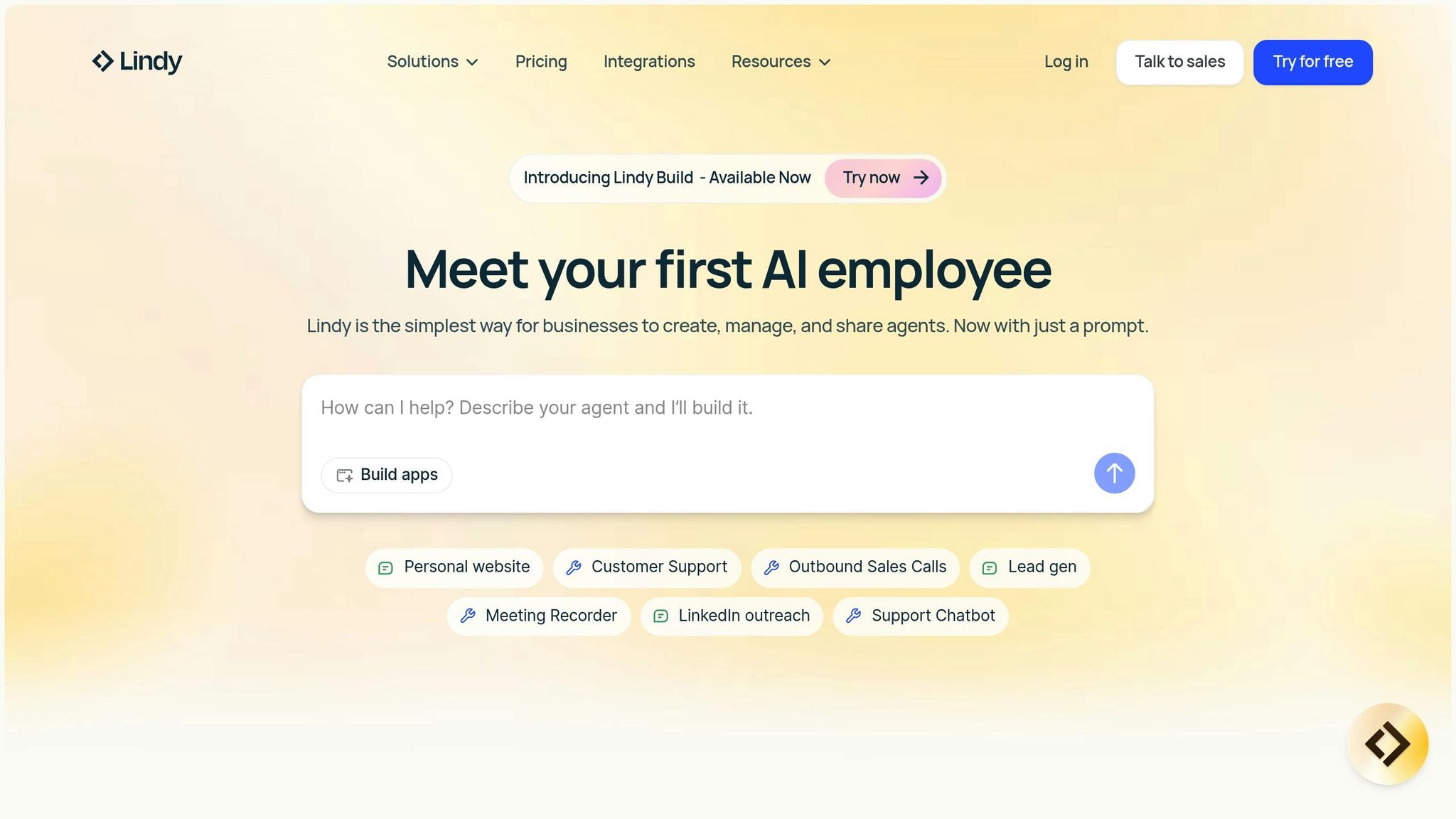
Lindy is an AI-powered personal assistant designed to simplify routine tasks through natural language commands. Unlike traditional automation tools that often require technical expertise or complex programming, Lindy enables users to create automated workflows by simply describing tasks in plain English. This user-friendly approach makes business automation accessible to teams of all skill levels, aligning with the goal of making workplace efficiency tools more intuitive and effective.
The platform is particularly adept at managing emails, scheduling calendars, and handling data entry - tasks that are essential to keeping businesses running smoothly. Lindy also learns and adapts to each user's behavior, ensuring that it mirrors their unique communication style.
Following the same principles as our first tool, Lindy integrates cutting-edge AI into everyday business operations while maintaining an emphasis on simplicity and usability.
Lindy takes routine business processes and transforms them into automated workflows that operate seamlessly in the background. Tasks like lead qualification, scheduling appointments, and managing follow-ups are handled effortlessly, without the need for constant human oversight.
Through its natural language processing capabilities, Lindy understands context and intent, enabling it to manage emails, prioritize tasks, and maintain a personal touch often lost with traditional automation tools.
Additionally, Lindy excels in data collection and analysis, automatically gathering and organizing information from multiple sources into actionable insights. This feature is particularly useful for sales teams, allowing them to track leads and monitor customer interactions across various channels with ease.
Lindy integrates seamlessly with widely-used business tools such as Gmail, Outlook, Salesforce, and HubSpot. By connecting with these platforms, it can access existing workflows and data without requiring businesses to overhaul their current software setups.
Thanks to its API-first architecture, Lindy also supports custom integrations with proprietary systems. This flexibility ensures it fits into established business processes rather than forcing companies to adapt to unfamiliar workflows.
Through these integrations, Lindy synchronizes data across platforms, eliminating the need for manual data entry - a common source of errors and inefficiencies.
Lindy is built to scale effortlessly, accommodating the needs of small startups to large enterprises. It adjusts its processing capacity to handle higher email volumes, more complex scheduling demands, and increased data processing requirements - all without compromising performance.
The platform's multi-user support allows entire teams to benefit from automated workflows while still tailoring the experience to individual preferences. Each user can train Lindy to align with their specific communication style and task priorities.
As businesses grow, Lindy grows with them, offering quick onboarding and immediate functionality without requiring extensive training. This adaptability makes it an ideal tool for organizations looking to streamline operations and keep pace with their expansion.
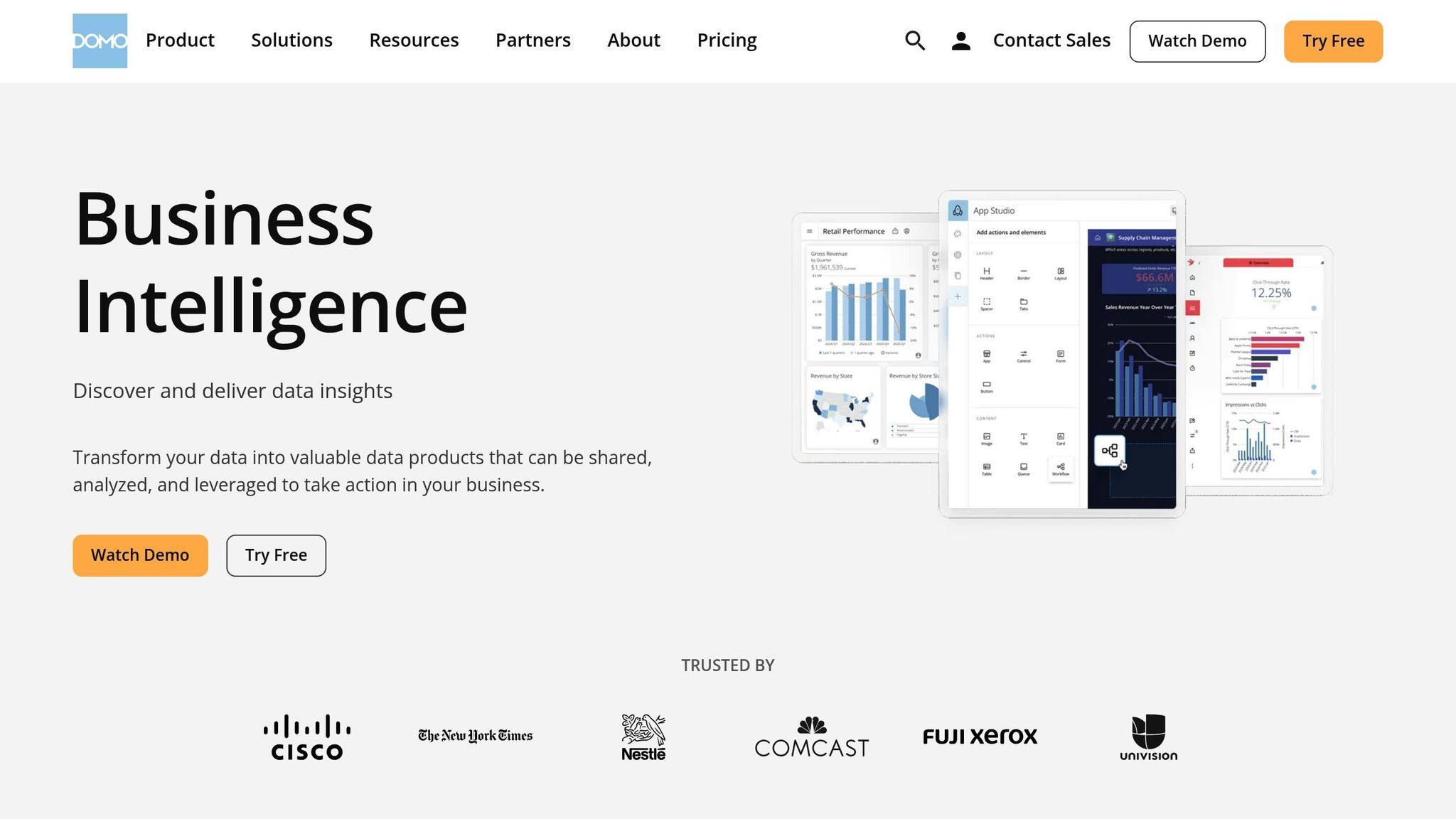
Domo is a cloud-based business intelligence platform that redefines how organizations manage data automation and visualization. By focusing on automated data processing and real-time analytics, Domo equips businesses with the tools to make smarter decisions faster, all powered by actionable insights.
The platform excels at bridging disconnected data sources and generating meaningful intelligence automatically, without requiring users to have deep technical expertise. Its standout feature is the ability to automate intricate data workflows while presenting insights through user-friendly dashboards, making it easy for decision-makers to act quickly and effectively.
Domo's commitment to democratizing data access ensures that insights are shared across the entire organization, empowering employees at every level - not just IT teams or data analysts - to leverage the power of data-driven decision-making.
Domo automates the entire data pipeline, handling everything from collection and cleaning to analysis and reporting. By pulling data from multiple sources, processing it based on predefined rules, and delivering insights through tailored dashboards, it eliminates the need for manual intervention.
The platform includes a real-time alerting system that monitors key performance indicators (KPIs) and sends notifications when thresholds are reached or anomalies arise. This proactive feature helps businesses address opportunities or challenges before they escalate.
Its ETL (Extract, Transform, Load) automation simplifies even the most complex data transformations, standardizing data from various sources. By removing the manual effort typically required for data preparation, teams can shift their focus to strategic planning and decision-making.
This seamless automation also extends to system integrations, ensuring a connected and efficient data ecosystem.
Domo offers over 1,000 pre-built connectors to popular business tools like Salesforce, QuickBooks, Google Analytics, and Microsoft Office 365. These integrations enable effortless data synchronization, keeping workflows smooth and uninterrupted.
For businesses with unique systems, Domo's API supports custom integrations, allowing proprietary databases and applications to integrate seamlessly. This flexibility ensures that organizations can enhance their existing technology stack without sacrificing compatibility or functionality.
Thanks to its cloud-native design, Domo adapts to varying data volumes and complexities, ensuring consistent performance even as data demands grow.
Domo's elastic cloud infrastructure scales effortlessly to meet the needs of businesses of all sizes. Whether supporting a team of 50 or an enterprise of 50,000, the platform adjusts processing power and storage to match data growth, maintaining reliable performance.
Its multi-tenant deployments allow different departments or units to maintain separate data environments while enabling collaboration when necessary. This is particularly advantageous for large organizations with diverse operational needs. Additionally, its mobile-first approach keeps insights accessible anytime, anywhere.
Domo prioritizes security and compliance, holding SOC 2 Type II certification and adhering to standards like HIPAA, making it a trusted choice for businesses in highly regulated sectors.
The platform enforces role-based access controls, ensuring sensitive data is only accessible to authorized individuals while still enabling broad access to relevant insights for other users.
With robust data encryption protocols, Domo protects information both during transmission and while stored. Automatic backups and disaster recovery features further safeguard business continuity, allowing companies to automate intelligence processes without compromising security or data integrity. This comprehensive security framework ensures that businesses can confidently scale their operations while maintaining compliance and trust.
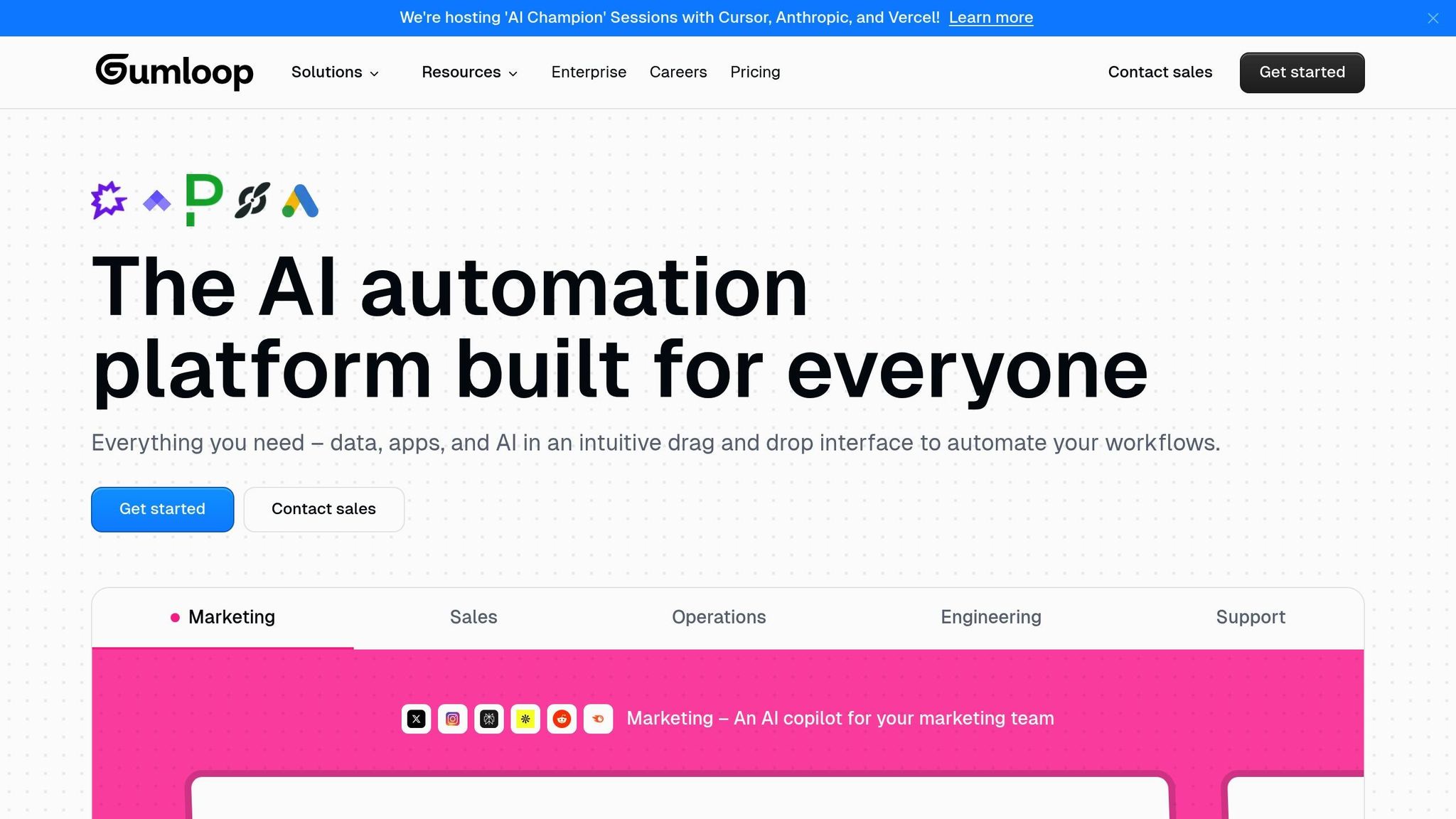
Gumloop stands out among productivity tools by combining visual simplicity with dynamic AI integration, making it a go-to platform for automating complex processes.
At its core, Gumloop is a visual workflow automation platform that simplifies intricate business operations into drag-and-drop workflows. It’s designed for teams that need powerful automation without the steep learning curve, enabling the creation of AI-powered workflows for tasks like data processing and customer interactions.
What sets Gumloop apart is its blend of no-code accessibility and enterprise-level functionality. It empowers business users - like marketing teams, operations managers, and analysts - to build automated workflows without relying on developers. This approach ensures that the people who know the processes best can design solutions tailored to their needs.
The platform also integrates AI models directly into workflows, automating decisions and scaling operations with precision.
Gumloop’s visual workflow builder makes automation intuitive with its drag-and-drop interface. Users can connect nodes to automate tasks ranging from collecting data to running AI analyses.
The platform shines in handling complex automation tasks that require data to pass through multiple stages. For example, a workflow could gather customer feedback from various channels, analyze sentiment using AI, categorize responses, and trigger personalized follow-ups - all without human intervention.
With conditional logic, workflows can adapt to different inputs, routing data through the appropriate steps automatically. This ensures that every piece of information is processed correctly, reducing the need for manual oversight.
Gumloop also supports scheduled and event-driven workflows, allowing processes to run automatically at set times or in response to specific triggers, like new data uploads or system updates. This flexibility keeps operations running smoothly and efficiently.
Seamless integration is a key strength of Gumloop. The platform offers native connections to widely used tools like Google Sheets, Slack, Airtable, and leading CRM systems. These integrations streamline data flow, eliminating the need for manual transfers.
For more specialized needs, Gumloop supports robust APIs and real-time webhooks, enabling businesses to connect custom databases, proprietary software, and industry-specific tools. Webhooks ensure real-time synchronization, making the platform ideal for time-sensitive tasks like customer support or inventory updates.
Gumloop is built to grow alongside your business, ensuring reliable performance even as demands increase.
Its cloud-based architecture automatically scales with workload demands, maintaining consistent performance as data volumes rise. Additionally, parallel processing allows multiple workflows to run simultaneously, making it possible to handle high-volume tasks - like processing thousands of customer inquiries or analyzing large datasets - without delays.
The platform’s usage-based pricing model makes it accessible to businesses of all sizes. Whether you’re a startup automating your first processes or an enterprise managing millions of transactions, you only pay for the resources you use, making it an economical choice for scaling automation efforts.
Security and compliance are central to Gumloop’s design. The platform uses enterprise-grade encryption to protect data both in transit and at rest, ensuring sensitive information remains secure throughout the automation process.
To support accountability and regulatory compliance, Gumloop provides audit logging, which tracks workflow executions, data access, and system changes. This visibility helps businesses meet regulatory requirements and monitor automated processes.
Role-based access controls add another layer of security by allowing administrators to assign specific permissions to team members. This ensures that users can only access or modify workflows relevant to their roles, enabling secure collaboration across teams.
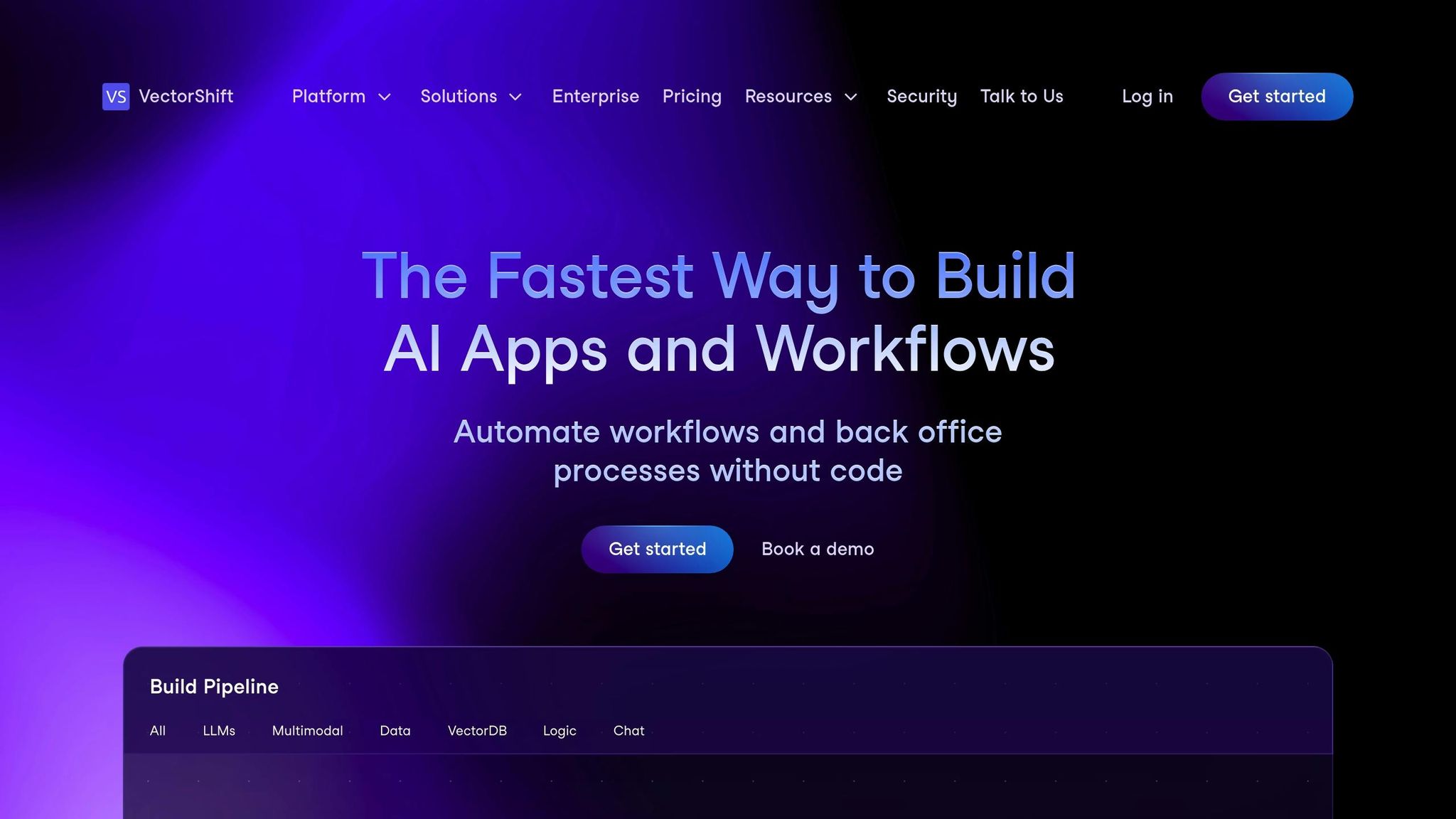
VectorShift brings together advanced AI and scalable workflow management, creating a powerful tool for business automation. This platform is designed to make cutting-edge AI accessible to business users while delivering the reliability required for large-scale operations.
By combining generative AI with enterprise-level workflow management, VectorShift empowers businesses to build workflows that understand context, generate content, and make intelligent decisions - all without requiring extensive technical expertise.
One of VectorShift's standout features is its visual pipeline builder, which allows users to create complex AI workflows through an intuitive interface. This approach enables professionals in fields like marketing, finance, and operations to directly translate their expertise into automated processes, eliminating the need for technical intermediaries.
VectorShift also excels in knowledge management, seamlessly connecting to existing data sources and documentation. This integration ensures that AI workflows are informed by company-specific knowledge, enabling them to operate with a deeper understanding of an organization’s unique context and procedures.
At its core, VectorShift simplifies intricate processes with its intuitive pipeline builder, which supports features like conditional branching and batch processing. These pipelines can integrate multiple AI models, ranging from large language models to specialized machine learning algorithms, to create comprehensive automation solutions.
The platform supports multi-step AI workflows, where the output of one model serves as the input for another. For example, a customer service pipeline might categorize incoming requests using natural language processing, route them to AI models for response generation, and then apply sentiment analysis to ensure the tone aligns with the company’s standards.
Conditional branching adds flexibility, allowing workflows to adapt dynamically based on AI outputs or specific data conditions. Meanwhile, batch processing enables businesses to handle large datasets efficiently, making it ideal for tasks like document analysis, data enrichment, or large-scale content creation.
VectorShift seamlessly integrates with popular business tools through its API connectivity, supporting platforms such as Salesforce, HubSpot, Microsoft Office 365, and Google Workspace. These connections allow for smooth data exchange between VectorShift and existing systems.
The platform’s knowledge base integration connects internal documentation, databases, and content repositories to workflows, ensuring outputs are contextually relevant and aligned with company-specific information. Additionally, real-time data synchronization through webhooks and streaming APIs makes it particularly useful for time-sensitive applications like customer support or personalized content delivery.
For organizations with proprietary systems, VectorShift provides flexible API endpoints, enabling deeper integration and tailored solutions.
VectorShift's cloud-native architecture ensures reliable performance and predictable costs, thanks to its usage-based pricing model. Businesses only pay for the AI processing and storage they use, making this platform suitable for both startups and large enterprises.
The platform includes load balancing capabilities, which distribute workflow execution across multiple servers to prevent performance bottlenecks during peak times. Additionally, performance monitoring tools track metrics like execution times, resource usage, and success rates, providing valuable insights for optimizing automation strategies.
Security is a top priority for VectorShift, with end-to-end encryption safeguarding data throughout every workflow. All communications between the platform and external systems adhere to industry-standard encryption protocols.
To meet compliance requirements, VectorShift maintains comprehensive audit trails that log workflow executions, data access, and system changes. These logs provide visibility into automated processes, aiding regulatory reporting.
Role-based permissions allow administrators to control access to workflows, data, and AI models, ensuring sensitive information is only available to authorized users. Additionally, data residency controls let businesses specify where their data is processed and stored, a critical feature for organizations with strict data governance requirements or those in regulated industries.
These robust security and compliance features make VectorShift a reliable choice for businesses seeking to enhance productivity while adhering to stringent operational standards.
Here’s a quick look at leading AI automation tools tailored for U.S. businesses, focusing on features, pricing, integration options, and security considerations.
| Tool | Key Features | Pricing (USD) | Integration Capabilities | Security & Compliance |
|---|---|---|---|---|
| Prompts.ai | Access to 35+ LLMs (GPT-4, Claude, LLaMA, Gemini), real-time FinOps cost management, model comparisons, and prompt workflow tools. | Free plan available; Creator: $29/month; Core: $99/member/month; Pro: $119/member/month; Elite: $129/member/month | Enterprise-level API connectivity, cloud service integration, and multi-model orchestration. | Governance tools, audit trails, role-based access, data encryption, and compliance with enterprise standards. |
| Lindy | No-code AI agent creation, pre-made automation library, agent swarms for complex workflows, and human-in-the-loop options. | Usage-based pricing (varies with automation complexity). | Integrates with HubSpot, QuickBooks, Slack, Gmail, Zoom, and over 2,500 additional applications. | Includes role-based access, audit logs, and data encryption. |
| Domo | Real-time data visualization, predictive analytics, and automated reporting for business intelligence automation. | Enterprise pricing (contact for quote; generally $1,000–$5,000/month for mid-size businesses). | Extensive native connectors for cloud platforms, databases, CRM, and ERP systems. | Adheres to multiple compliance frameworks with strong security controls. |
This table outlines how each tool caters to core business needs, emphasizing the importance of streamlined AI workflows.
When choosing automation tools, cost and integration capabilities are often make-or-break factors. With AI budgets growing, businesses are prioritizing solutions that deliver savings and efficiency. For instance, Prompts.ai’s pay-as-you-go approach can reduce AI software expenses by as much as 98%, while enterprise platforms like Domo require higher upfront commitments. This variability in pricing models can complicate budgeting, with 65% of IT leaders citing unexpected SaaS charges due to usage-based billing.
Integration is another critical element. Lindy excels with its expansive third-party app compatibility, while Domo shines with its deeper integration into enterprise systems. Seamless connectivity with existing cloud services, identity providers, and business tools plays a pivotal role in ensuring smooth implementation and long-term operational success.
All three platforms prioritize strong security, offering features like encryption and audit trails. Prompts.ai stands out with detailed data residency controls, a must-have for organizations with stringent governance requirements. Beyond security, AI automation delivers tangible results - cutting operational costs by 20–30% and boosting efficiency by over 40% on average. Globally, AI-powered automation is expected to save industries up to $4.4 trillion annually while reducing labor costs by as much as 30%.
The five AI automation tools discussed in this guide signal a transformative shift in how businesses across the U.S. can streamline operations. Each platform offers distinct features designed to boost efficiency, making them well-suited for organizations of all sizes.
Selecting the right tool involves aligning its specific strengths with your business's unique needs. This ensures smooth integration into current workflows, effective cost management, and scalable solutions that position your company for long-term growth and a competitive advantage.
With the rapid adoption of AI, maintaining security and compliance is more critical than ever. The platforms covered here prioritize data protection with features like encryption, audit trails, and role-based access controls, offering peace of mind alongside improved efficiency.
To select the best AI automation tool for your business, begin by pinpointing your specific goals and challenges. Focus on solutions that directly address these needs and have proven success within your industry. Key considerations include ease of use, scalability, and how readily your team can adopt the tool. Prioritize platforms with user-friendly interfaces and comprehensive documentation to simplify the learning curve.
Testing the tool through a small-scale pilot program is a practical way to assess its effectiveness in real-world applications. Additionally, evaluate the total cost, potential return on investment (ROI), and how seamlessly the tool integrates with your current systems. This ensures the solution complements your business objectives and operational framework.
Integrating AI automation tools into existing systems can present a range of challenges. Older software, outdated APIs, or isolated data systems often create compatibility issues that complicate the process and disrupt workflows. Addressing these technical barriers can demand considerable time and effort.
Beyond technical concerns, businesses may also encounter hurdles such as low-quality data, security risks, employee resistance to adopting new technologies, and insufficient in-house expertise to manage AI solutions effectively. Tackling these issues requires a combination of strategic planning, thorough training programs, and allocating the right resources to ensure the integration process runs smoothly.
AI automation tools play a critical role in protecting sensitive information and ensuring adherence to regulations by integrating robust security measures and aligning with standards like GDPR, ISO/IEC 42001, and NIST AI RMF. These tools actively monitor operations in real time, identifying and addressing potential threats to minimize risks and maintain regulatory compliance.
To navigate stringent industry requirements, these solutions feature automated security testing, well-defined governance structures, and transparent data management practices. By reducing the likelihood of human error and simplifying compliance workflows, they enable businesses to safeguard their systems and meet legal obligations with greater efficiency.


